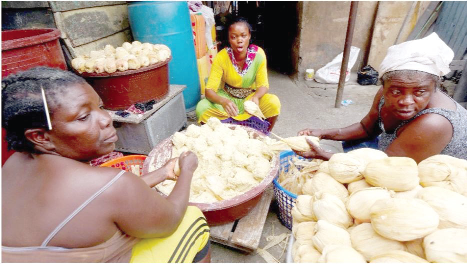Compromising health with street eating?
My crave for a good heavy afternoon meal got me into getting a ball of Ga kenkey with red chili pepper and some cassava fish to satisfy my hunger for the afternoon.
The food was neatly wrapped for me and I sped off to the office, so to comfortably sit and enjoy, not just an afternoon meal, but a meal I had craved to have that day.
At my very first attempt to dig into the tempting kenkey, I spotted a strand of hair in the ball, but because I was eager to eat, I pulled the hair out and continued with my meal.
Reaching out with my kenkey into the pepper, I again spotted a red rubber band in the pepper and this took away my appetite completely and got me asking, “How did the strand of hair and the rubber band find their way into the kenkey?”
This experience is not peculiar to me, as many others, who for one reason or the other have to take at least a meal outside the home, also do.
Most workers across the country find themselves in situations that compel them to buy from all sorts of vendors at the most affordable price, regardless of the space (dirty, smelly and untidy) within which the food is sold.
No wonder the Maamobi General Hospital in Accra recorded 154 food related complications in the form of gastroenteritis (133) and Salmonella (localised and general) (21) in October 2022 alone, as indicated by Dr Millicent Adjebu at the emergency ward of the hospital. She is of the firm belief that better and healthier eating practices could have prevented such avoidable health complications, and thus, reducing pressure on hospital staff and facilities.
Most people, preferably would have loved to prepare food from home for lunch, but are unable to do so.
According to some workers, the feeling of having a different taste, just for a change, is another reason for eating outside the home.
Every morning, men and women alike, including children, struggle in long queues just to satisfy their food needs.

The long queues can be seen at popular waakye, banku, red red and fufu joints, dotted across the country.
Conditions
Generally, there have been improvements in the preparation and selling of food nationwide, but there is still much to do, as often, the conditions under which some street vendors operate are unsuitable for the preparation and selling of food.
The food is normally prepared either at home or in stalls located by the sides of streets and even under trees, on top of huge undesilted gutters, near public places of conveniences, refuse dumps, public urinaries and sometimes dusty environments, making it possible for the food to be contaminated with germs, bacteria, foreign material (like the hair and rubber band I found in the kenkey and pepper, respectively).
Thus, uncovered hair and long wigs by cooks when cooking and serving also find their way into the foods and surfaces used by most vendors for serving or cooking, while some cooks also add the leftovers of the previous day’s food to what is being prepared for the day.
With all these are the flies, as the stalls and areas for cooking are not enclosed properly.
Foreign materials, such as, rubber bands, razor blades, pins and sharp inedible objects, all sometimes find their way into the foods sold, because most of the cooking may have been done at dawn, in poorly lit areas and also because of the urgency to finish early, and also the commercial nature of cooking such foods in large quantities, making it difficult to thoroughly check and leading to all these materials ending up in food sold.
Congregate
Many vendors congregate in overcrowded areas, such as, the fitting or auto mechanic shops, schools and hospitals, where there are high numbers of potential customers with limited access to basic sanitary facilities, for example toilets, washrooms, disposal sites and changing rooms, all presenting means for the contamination of street foods.
Additionally, leftovers, papers, rubber bags, and other waste generated during the preparation and selling of food are usually dumped at the same places where food is sold, while vendors, selling near choked gutters discharge liquid and solid waste into them.
There are by-laws to regulate the activities of food vendors. The Accra Metropolitan Assembly strictly monitors food venders under its jurisdiction to ensure adherence, but with little results.
Much more
Much more effort is required to properly regulate the activities of these food vendors, to help foster a healthier life for citizens.

Proper certification from appropriate authorities should not be taken for granted, while consumers must insist on the quality of what they buy and not quantity.
Vendors, especially women should have their hair covered before, during and after preparation of food. Education from both public health personnel and consumers with strict continuous monitoring and adherence ought to be initiated to ensure the safety of the Ghanaian street eating public.
While the vendors are required to be conscious and consistently maintain hygienic approaches in the preparation of food, consumers are also encouraged to take necessary steps to ensure the consumption of safe food, reminding ourselves that “you are what you eat” to keep healthy and stay safe.
The public health and safety departments of the various local authorities and the Food and Drugs Authority (FDA) must collaborate to ensure the safety of all who eat out of their homes daily.
We must eat for health and not only for satisfaction.
The writer is a staff of the Information Services Department (ISD). E-mail: del77sly@yahoo.co.uk



